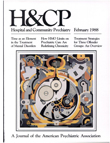The Insanity Defense for Sex Offenders: Jury Decisions After Repeal of Wisconsin's Sex Crimes Law
Abstract
After repeal of a Wisconsin statute permitting hospitalization of defendants convicted of sexual crimes, the authors noted an increase in the percentage of sex offenders among persons hospitalized after being found not guilty by reason of insanity. They also found that a greater proportion of hospitalized sex offenders than of other kinds of offenders were diagnosed as nonpsychotic. Illustrating with three case studies, the authors argue that despite trends away from the therapeutic model of corrections, juries continue to make decisions that provide treatment for defendants perceived to need it, even if the legal criteria for those decisions do not appear to be met.
Access content
To read the fulltext, please use one of the options below to sign in or purchase access.- Personal login
- Institutional Login
- Sign in via OpenAthens
- Register for access
-
Please login/register if you wish to pair your device and check access availability.
Not a subscriber?
PsychiatryOnline subscription options offer access to the DSM-5 library, books, journals, CME, and patient resources. This all-in-one virtual library provides psychiatrists and mental health professionals with key resources for diagnosis, treatment, research, and professional development.
Need more help? PsychiatryOnline Customer Service may be reached by emailing [email protected] or by calling 800-368-5777 (in the U.S.) or 703-907-7322 (outside the U.S.).



